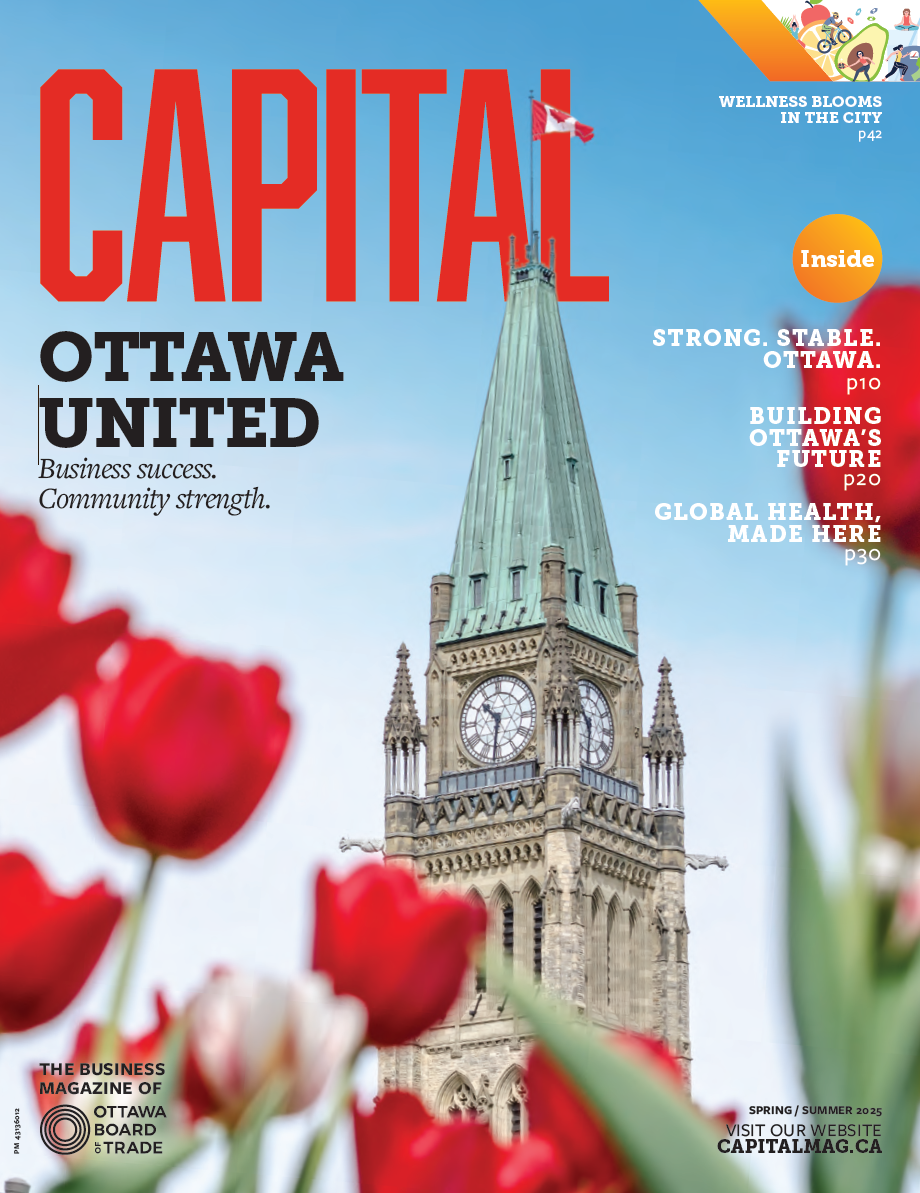Feature: Collaboration, Communication and Candour

Three keys in rebuilding the economy in the Nation’s Capital
By Jennifer Campbell

Zoom meetings left to right: Sueling Ching, Dr. Vera Etches, HON. Catherine McKenna, HON. Lisa McLeod, HON. Merrilee Fullerton, HON. Mona Fortier
There is no question the pandemic has been devastating in so many ways, but our road to recovery has engendered a new spirit of co-operation among business, health, and government leaders in the capital that inspires hope.
“As we contemplate a complicated recovery, we must maintain a very high level of collaboration,” says Sueling Ching, president, and CEO of the Ottawa Board of Trade. “The pandemic has revealed a lot of fault lines within our businesses, communities, and government. We have a unique opportunity and an undeniable responsibility to revisit our priorities because of the incredible inequities that have been highlighted within our society.”
Ching points to the disproportionate burden on women as an example.“One might have said we were making progress on the issue of gender equality,” she says. “But the pandemic has completely changed that conversation because of the incredible burden that women have faced during this time.”
She says Ottawa is fortunate to have several strong females at the helm of this collaboration, including but not limited to Vera Etches, Ottawa’s chief medical officer of health; Merrilee Fullerton, provincial minister of long-term care and MPP for Kanata; Catherine McKenna, federal minister of infrastructure and communities and MP for Ottawa Centre; Lisa MacLeod, provincial minister of heritage, sport, tourism and culture industries and MPP for Nepean; and Monica Fortier, MP for Vanier, minister of middle-class prosperity and associate minister of finance, among many others in government, non-profits and business.
Ching says the recovery has given Ottawa “a chance to create the community we always wanted to be” by addressing the needs of those who are marginalized and the way Ottawa approaches issues like environment and sustainability, transportation, and infrastructure when considering new economic strategies.
“We are not just working to build back. We are facing an economic evolution,” she says. “We need to look beyond maintaining and elevate the level of collaboration, communication, and candour that we’ve exercised over these past eight months. We need to move from reactive and put those tools to work in a more thoughtful and strategic manner so we can get to the next level of community and city building. That requires strong leadership.”
The good news
Asked to name some successes so far, Ching says that for her, the mere level of collaboration is a success.
“Our collective understanding that the economy and public health are inextricably linked along with our commitment to conversations about the faults in our systems, is something to build from,” she adds. “Some businesses transformed in the last eight months in a way that may have otherwise taken a decade to achieve. We had already identified digital transformation as a key to compete in the global economy, but many businesses were not there yet and that became evident during the pandemic. Now businesses have an opportunity to evolve and have the government support them through programs designed to keep businesses alive and thriving. It is our hope and intention that businesses will take advantage of these programs to create long term growth.”
Fullerton echoes those sentiments.
“Whether it has been in my riding in service of the residents of Kanata-Carleton, or in my capacity as minister of long-term care, I am certain that it is through the collaboration and innovation across all sectors that we are making the necessary advances to ensure a prosperous future,” Fullerton says.
Ching says the government’s relatively quick response with numerous programs to help businesses might otherwise have taken years to build and is appreciative that government officials have been open to tweaking them to respond to changing needs.
“The open lines of communication between business and government are definitely a huge success,” she says. “There are leaders in our community who will be long remembered by how they behaved during this pandemic.”
Her hope is that those leaders will continue to lead with integrity, listen, and collaborate. And that businesses understand that while the government is responsible to create a competitive business environment that ultimately, they need to rely on the same sense of ownership, ingenuity, and resilience that inspired them to become entrepreneurs in the first place.
“Yes, there have been lockdowns, and yes, governments have imposed restrictions that no one could have anticipated. Obviously, many businesses were not prepared for that,” she says. “However, there were businesses that were able to withstand it. And even now, the government will only be able to go so far in supporting them. They must be resilient; they must be innovative and on-trend to succeed and be prepared to mitigate setbacks.”
Fortier is proud of the way local businesses responded.
“As a member of Parliament from the National Capital Region, I have been proud to see so many of our local businesses and organizations retool and step up to meet the needs of our community during this unprecedented time,” Fortier says. “We all have a role to play in meeting this challenge and if we continue to follow the advice of public health officials [such as] Dr. Tam and Dr. Etches, together, we will get through this.”
McKenna responded similarly.
“I hear from Ottawa businesses every day about how hard it is to adapt and survive in the pandemic,” McKenna says. “My focus and that of our government is on supporting businesses through this challenging time, including adapting our programs based on your feedback. We will get through this by working together and will emerge as an even stronger community.”
The open lines of communication between business and government are definitely a huge success
The next steps
In terms of leadership, Ching says Ottawa needs leaders who are willing to set a plan and strategy for our economy to grow, one that businesses can see themselves in and stakeholders can support. “We need to increase business, consumer, and workforce confidence as it is private enterprise that will lead the city into recovery.”
“I would suggest radical collaboration with the business community when creating policies and programs and a firm commitment to broadband access across the board,” she says. “We knew we needed it before, and then it became critical.”
The same is true for our child-care, education, health, and long-term care systems. The pandemic has simply highlighted the need to review and modernize these systems to be more aligned with our economic goals and support our vulnerable and marginalized populations.
In terms of lessons learned, local leaders had an advantage by witnessing the actions and outcomes of jurisdictions that were ahead of us including the value of mandatory masking. However, we could have been better prepared on issues such as access to PPE, rapid testing, and effective contact tracing. These areas still require development as key factors for getting back to work, staying in school, and engaging in the economy.
From a business point of view, she says people learned how important it was to be able to digitize their businesses, how important a strong financial pad is, and how to expand their markets through online marketing and exporting as well as product and process innovation. Entrepreneurs will continue to build on these areas for future success.
“In general, the whole community must be more committed to supporting local,” Ching says. “Our consumer dollar is powerful. Small and medium enterprises are critical to our community culture. Local entrepreneurs provide jobs, support community causes, and provide essential and unique products and services. Many main street businesses have been on the front lines of this war against COVID; mitigating restrictions, implementing safety protocols, maintaining a workforce, and facing a reduced market with remote working and lack of tourism.”
Looking to the future, she says there will be interesting opportunities for certain sectors and for those who are able to adapt to new trends. At the same time, we must find a way to support the businesses that have been critical to our quality of life. And that requires all of us to do our part.






















